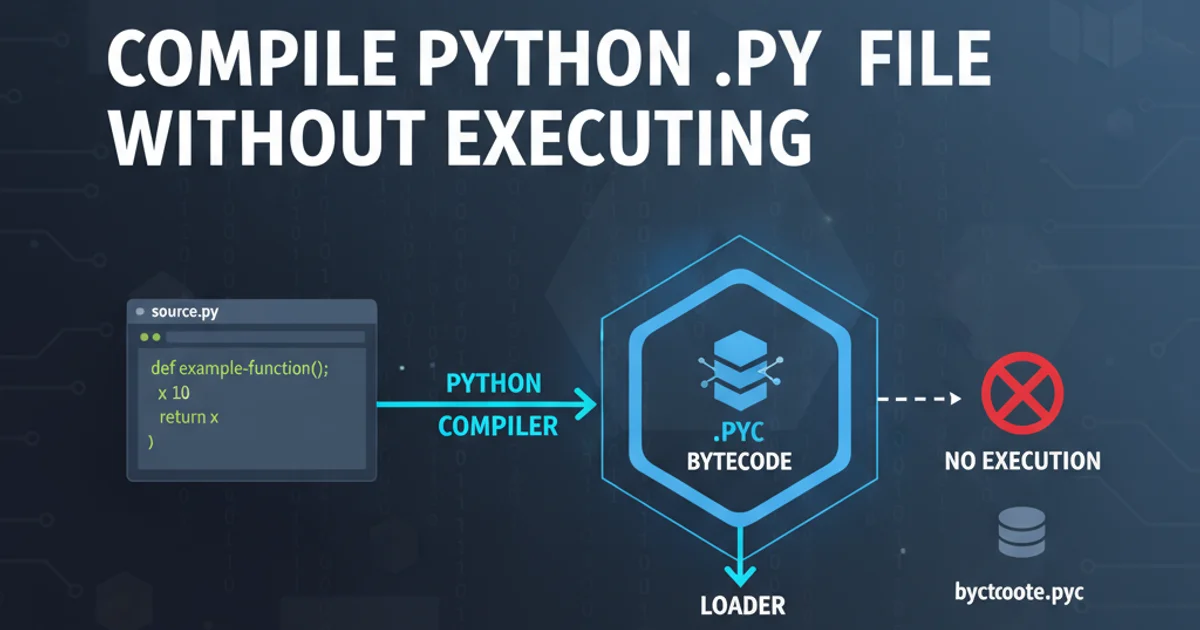compile python .py file without executing
Categories:
Compile Python .py Files Without Execution: A Deep Dive into Bytecode

Learn how to compile Python source code into bytecode (.pyc files) without immediately executing it, understanding the 'compileall' module and manual compilation techniques.
Python is an interpreted language, but it doesn't execute source code directly from .py files every time. Instead, it compiles them into an intermediate format called bytecode, which is then executed by the Python Virtual Machine (PVM). This bytecode is typically stored in .pyc files (or within __pycache__ directories for Python 3+). Understanding how to compile these files explicitly, without running the script, can be useful for various reasons, such as pre-deployment optimization, checking for syntax errors, or simply understanding Python's internal workings.
Why Compile Without Executing?
While Python automatically compiles .py files to .pyc when they are imported or run, there are scenarios where you might want to trigger this compilation manually without the side effect of execution. This can be beneficial for:
- Pre-deployment checks: Ensure all modules compile correctly before deploying an application, catching syntax errors early.
- Performance optimization (minor): For large applications, pre-compiling all modules can slightly reduce startup time by avoiding on-the-fly compilation during the first run.
- Distribution: Distributing
.pycfiles can sometimes be preferred if you want to prevent easy modification of source code, though it offers minimal protection. - Understanding Python internals: Exploring how Python handles compilation can deepen your understanding of the language.
flowchart TD
A[Python Source (.py)] --> B{Python Interpreter}
B --> C{Bytecode Compiler}
C --> D[Bytecode (.pyc)]
D --> E{Python Virtual Machine (PVM)}
E --> F[Execution Result]
subgraph Manual Compilation
G[User Action] --> H{compileall module}
H --> D
end
subgraph Automatic Compilation
B --> C
end
style G fill:#f9f,stroke:#333,stroke-width:2px
style H fill:#bbf,stroke:#333,stroke-width:2pxPython's Compilation and Execution Flow
Method 1: Using the compileall Module
The compileall module is Python's standard library tool for compiling entire directories of Python source files. It's the most robust and recommended way to pre-compile your project.
python -m compileall /path/to/your/project
Compiling a directory using compileall from the command line.
This command will recursively find all .py files within /path/to/your/project and its subdirectories, compiling them into .pyc files within __pycache__ directories. If a .pyc file already exists and is up-to-date, it will be skipped.
You can also use compileall programmatically within a Python script:
import compileall
import os
# Compile a single file
# compileall.compile_file('my_script.py')
# Compile an entire directory
project_root = os.path.abspath(os.path.dirname(__file__))
compileall.compile_dir(project_root, force=True)
print(f"Successfully compiled Python files in {project_root}")
Programmatic use of compileall.compile_dir.
force=True argument in compile_dir ensures that all files are recompiled, even if their .pyc files are already up-to-date. This can be useful for ensuring a clean compilation.Method 2: Manual Compilation with py_compile
For compiling individual files, the py_compile module offers a more granular approach. This module provides a compile() function that takes the source file path and an optional output path for the bytecode file.
python -m py_compile my_script.py
Compiling a single file using py_compile from the command line.
This command will compile my_script.py and place the resulting .pyc file in the __pycache__ directory relative to my_script.py.
Programmatically, you can use py_compile.compile():
import py_compile
try:
py_compile.compile('my_script.py')
print("my_script.py compiled successfully!")
except py_compile.PyCompileError as e:
print(f"Compilation failed: {e}")
# You can also specify the output file path
# py_compile.compile('another_script.py', cfile='compiled_scripts/another_script.pyc')
Programmatic use of py_compile.compile().
py_compile.compile(), if you don't specify cfile, the .pyc file will be placed in the standard __pycache__ directory. If you do specify cfile, ensure the directory exists, or you'll get a FileNotFoundError.Method 3: Using compile() Built-in Function (Advanced)
For the most low-level control, Python provides the built-in compile() function. This function compiles source code into a code object, which is the internal representation of bytecode. This code object can then be executed using exec() or eval(), but the compile() step itself does not execute the code.
source_code = """
def greet(name):
print(f"Hello, {name}!")
greet("World")
"""
try:
# Compile the source code into a code object
code_object = compile(source_code, '<string>', 'exec')
print("Source code compiled into a code object successfully.")
# The code object itself is not executed here.
# To execute it, you would use exec(code_object)
# exec(code_object)
except SyntaxError as e:
print(f"Syntax error during compilation: {e}")
Using the built-in compile() function.
The compile() function takes three main arguments:
source: The string containing the Python source code.filename: A string representing the file from which the code was read. This is used for error messages and can be<string>for code passed as a string.mode: Specifies the kind of code to be compiled. Common modes are:'exec': For a sequence of statements (like a module).'eval': For a single expression.'single': For a single interactive statement.
This method is primarily used when you need to dynamically compile code strings at runtime, rather than pre-compiling files for deployment.
compile() generates a code object, it does not save it to a .pyc file. If you need to persist the bytecode, you would typically use py_compile or compileall.Conclusion
Compiling Python .py files without immediate execution is a straightforward process, primarily handled by the compileall and py_compile modules. These tools are invaluable for preparing your Python applications for deployment, performing early syntax checks, and gaining a deeper insight into Python's internal compilation mechanism. For most use cases, compileall is the go-to solution for project-wide compilation, while py_compile offers fine-grained control over individual files.